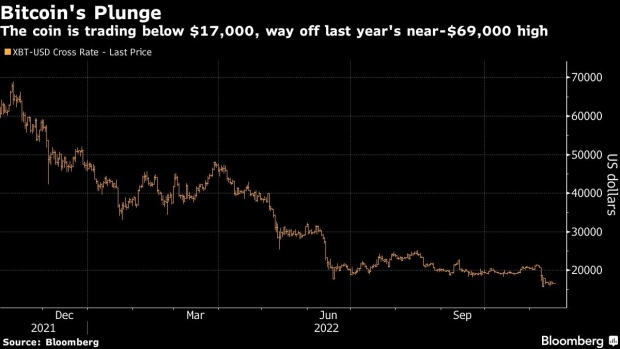Nov 16, 2022
Winklevoss Faithful Have a $700 Million Problem in Genesis Halt
, Bloomberg News

(Bloomberg) -- The billionaire Winklevoss twins, owners of the Gemini crypto exchange, have always portrayed themselves as the grownups in the room. The ones who ordinary investors could trust.
None of that is sparing a chunk of Gemini’s customers from the fallout triggered by FTX’s collapse, which risks taking down a big swath of the industry.
The trouble stems from a product called Gemini Earn -- which lets investors accrue as much as 8% in interest by lending out their crypto, including Bitcoin, Ether or stablecoins pegged to the dollar. It’s a kind of product, widely used throughout crypto, that looks and feels very much like high-yield savings accounts, but with far fewer safeguards if things go wrong.
And in the case of Earn, Gemini’s website listed just a single accredited borrower that passed its vetting process: Genesis Global.
On Wednesday, in response to Genesis suspending withdrawals amid FTX’s spreading contagion, Gemini also halted redemptions from its Earn product. That left in limbo a program that, according to a person familiar with the matter, has $700 million of customer money tied up in it. The person asked not to be named because the information isn’t public.
“People are holding their breath at the moment, waiting or seeing if there’s going to be another shoe to drop and what those shoes will be,” Gregory d’Incelli, co-founder of Scenius Capital Management, said in an interview. “People are still in shock. A lot of people are very wounded right now.”
Gemini, which was founded by brothers Cameron and Tyler in 2014, said on its website that it is “working with the Genesis team to help customers redeem their funds from the Earn program as quickly as possible.”
The firm added that “all customer funds held on the Gemini exchange are held 1:1 and available for withdrawal at any time.” Gemini declined to comment beyond Wednesday’s press release.
Whether Gemini Earn customers, who collectively are significant lenders to Genesis, ever get their money back remains to be seen. And much depends on Genesis itself, which has hired advisers to explore all possible options, including raising new funding. Genesis, one of oldest and most well-known crypto brokers, has itself been a big player in crypto lending. The firm had $2.8 billion in total active loans in the third quarter, according to its earnings report.
Whatever the case, the situation underscores a crisis of confidence -- undercut by a collapse in asset prices, FTX’s implosion and now Genesis’s troubles -- that may herald a larger reckoning across the industry. It’s a blow to the ambitions of regulation-friendly firms like Gemini, whose fortunes are in large part tied to crypto’s mainstream adoption, and shows that few players are firewalled from the risks inherent in a world where rampant speculation with few guardrails remains the norm.
It also throws into stark relief the role of yield products, which have often been marketed and popularized as less risky bank-like alternatives, as a source of much of the speculative froth that exists in crypto.
“It’s going to affect the credibility for the whole space,” said Max Gokhman, chief investment officer at asset manager AlphaTrAI. “Because at the end of the day, especially for retail investors or crypto-native folks who don’t understand that if I trade something with a counterparty that’s not regulated in the US, I can’t go to the SEC, the CFTC or anyone else and say, ‘Hey I was robbed.’”
To be sure, Gemini’s claims of being insulated from the immediate fallout of sagas like Genesis’s have a firmer basis than other industry players saddled with leverage. While the company marketed the Earn program on its website along with yield calculators and assurances about vetting, the firm itself was just a conduit for loans made by its customers to outside borrowers. The company’s other operations, including spot exchange are functioning as normal.
When all was well, Genesis generated profits in part by lending out assets that it borrowed from those like Gemini Earn customers, often at sky-high rates. Earn customers took a cut in interest, Gemini got a slice as the middleman and Genesis kept the rest.
On its website, Gemini says its borrowers are “vetted through our risk management framework which reviews our partners’ collateralization management process.” Gemini reviews partners’ cash flow, balance sheet and financial statements “on a periodic basis.”
Yet signs of trouble started to emerge at Genesis earlier this year. Genesis’s lending business already faced trouble when crypto hedge fund Three Arrows collapsed. It had made a $2.4 billion loan to the now-bankrupt fund, run by Su Zhu and Kyle Davies.
Last month, Genesis reported that lending plunged 80% in the third quarter from the prior three-month period and that most of the rest of its businesses also experienced substantial declines. Then, Genesis said last week it would get a $140 million equity infusion from its parent company, Barry Silbert’s Digital Currency Group, after disclosing that its derivatives business had $175 million locked in an FTX trading account.
On Wednesday, Genesis suspended redemptions and new loan originations after facing withdrawal requests that exceeded current liquidity. In other words, people wanted their money back from Genesis and Genesis couldn’t meet those demands.
For Gemini’s Earn customers, they’re largely on their own. Despite reassurances that Gemini was “working with the Genesis team to help customers redeem their funds from the Earn program as quickly as possible,” the terms of the agreement make plain who bears all the risk.
“Your available digital assets will leave our custody, and you accept the risk of loss associated with loan transactions, up to, and including, total loss.”
©2022 Bloomberg L.P.





